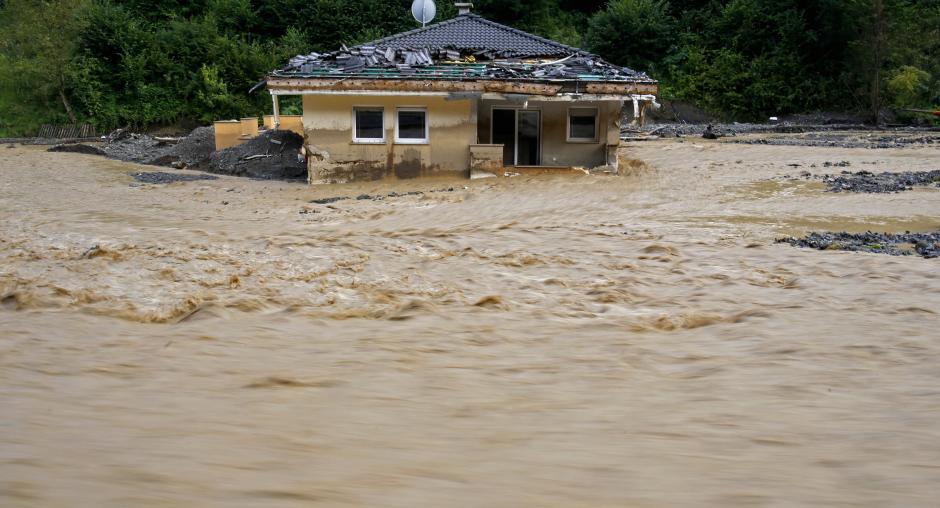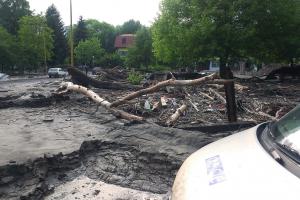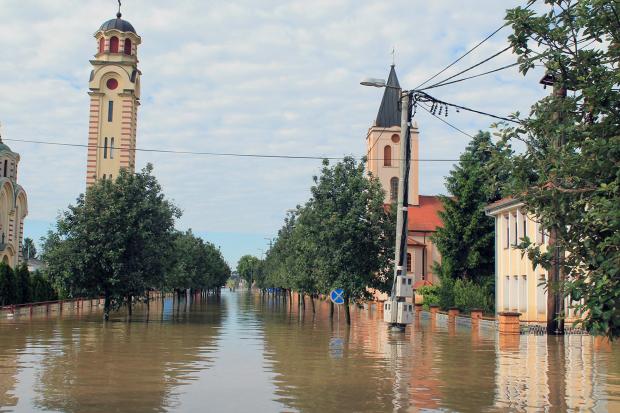Water knows no borders
When floodwaters started to surge, mid last year, into apartments in Šamac, in northern Bosnia and Herzegovina, those living on the upper floors of buildings rushed to accommodate their neighbours. Days passed with no running water or electricity. Food and supplies were shared across hallways and strung from balcony to balcony until rescue teams in rafts could make deliveries.
Video: The floods washed away homes, cars, bridges, and in some places, mine fields still in place since the war.
As the water receded, brigades of volunteers from different communities came by bus to help clear debris and dig the mud out of homes. Many citizens of BiH said they had not seen this kind of neighbourly co-operation and support since before the war.
Efforts to relieve, recover, and rebuild could be witnessed throughout BiH and Serbia, the countries hardest hit by the May 2014 floods in South Eastern Europe. Helicopters, boats, industrial water pumps and emergency personnel were rushed in from Croatia, Montenegro, Slovenia and other countries in the region. Individuals, NGOs and Governments from across the world donated supplies and money to the relief and recovery effort.
In the immediate aftermath of the flooding, the OSCE Mission to BiH opened five temporary premises in heavily-affected areas to monitor conditions at the local level, support continued delivery and transparency by municipal services, and assist organizations and authorities in various recovery efforts.
The flood zone
Nearly one year after the floods, communities are still facing the consequences of last year's devastation. Many schools, hospitals and houses have been repaired or reconstructed, but the recovery process remains in its relatively early stages as some affected areas will take years to fully recuperate. As reconstruction is on the minds of flood and landslide victims, so is flood prevention and disaster risk reduction. This remains a serious concern in places like Šamac located at the confluence of the Bosna and Sava Rivers across from Croatia.
Better co-ordination among authorities both within BiH and regionally and reconstruction of key flood prevention infrastrucure remain priorities.
“The rivers or canals start in one municipality, and then flow into others, making it not a local problem but a regional one,” said Milan Gavrić, an engineer at the water company UŠČE Bosne in Šamac Municipality. Gavric explained that there had been one Yugoslav water management system before, but it is now administered separately by different countries. In BiH water management is further fragmented between the two entities, Republika Srpska (RS) and the Federation of BiH (FBiH).
In his office at the Šamac Civil Protection Unit, Milan Blagojević explained how during the floods his only contact with neighbouring municipalities in the FBiH was through informal channels. “I called my friend who works in the next municipality and said ‘we’re flooded here in Šamac, so expect water coming your way by tonight.”
Planning, preparation, prevention
In the wake of the flooding, OSCE Chairperson-in-Office and Serbian Foreign Minister Ivica Dačić designated regional co-operation on water management as a top priority, with an emphasis in South Eastern Europe on natural disaster risk reduction and disaster response. The OSCE is working to promote better management of water resources as part of its comprehensive approach to security. This is the theme of the 2nd Preparatory meeting of the 23rd Economic and Environmental Forum, taking place on 11 to 13 May 2015 in Belgrade, Serbia, with a field trip across the river to Obrenovac, Serbia, and Bijeljina, BiH, to observe recovery efforts there.
Since the flooding, the OSCE has hosted numerous events in South Eastern Europe bringing together civil society representatives, water management experts, OSCE staff, and local and regional authorities to discuss the co-ordination of future disaster relief and to promote best practices in river basin management.
“The OSCE to an extent plays a big role in promoting co-operation among the various authorities,” said Suad Salkic, an OSCE Officer at the temporary office in Šamac. “At the moment, a lot of the co-operation is based on ad hoc and personal relations, not a strong formal mechanism. To achieve lasting results, the OSCE can help bring authorities together to reform certain policies. ”
In November 2014, the OSCE Mission to BiH, in partnership with the BiH Security Ministry , United Nations Development Program (UNDP), and the Regional Arms Control Verification and Implementation Assistance Centre’s (RACVIAC)-Centre for Security Co-operation released a report of conclusions and recommendations advocating for multiple improvements to domestic preparedness and cross-border co-operation in line with the EU Flood Directive. It recommended creating flood risk maps, developing early warning systems, and improving flood risk communication and planning. The report also suggested updating bilateral agreements on rescue operations, conducting joint training exercises for natural disaster scenarios, and standardizing the procedures and products of national hydro-meteorological agencies.
“We have a fragmented system with no management from one point, but we are in the process of harmonizing response plans on the entity and municipal level,” said Protection and Rescue Sector of the BiH Security Ministry, Samir Huseinbašić, which oversees disaster response on the national level. “There is room for improvement in building up teams for flood response in areas with trans-boundary rivers.”
Progress is being made on developing ties between regional authorities and strengthening old relationships. The 21st bilateral meeting of the Commissions for Water Management of Croatia and BiH was held last December at the Posavina Canton Government, in BiH, and a meeting of Sava River Municipalities was held recently in Sremska Mitrovica, Serbia, with representatives from Slovenia, Serbia, Croatia, Montenegro, and BiH in attendance. Regional organizations like the Sava River Commission are continuing their important work on trans-national water management.
A problem with many facets
If you build up the dyke in Šamac but the neighbouring municipalities don't, then everyody will be flooded anyway.
Suad Salkic OSCE Officer at the temporary office in Šamac
The floods caused more than just physical damage and the response will require more than just rebuilding houses, institutions and dikes. The long-term economic impacts are becoming apparent as businesses stay shuttered for lack of financing, and farmers struggle to recover after entire herds of livestock drowned. Šamac alone lost a third of its agricultural output last year according to Head of the Šamac Economic Development Department Svetozar Evđić.
Environmental and health concerns are also of great importance. With the rising waters, years of accumulated waste was swept down-river. Rotting animal carcasses and heavy metals from industrial sites contaminated municipal drinking water in the Sava and Bosna river basins according to Alexander Panić, from the Swiss Red Cross. He and his team are working to find high ground for new wells that would provide potable water during a disaster.
Creative proposals are being made to solve many of these problems and to prepare for future floods and natural disasters. A proposal by the UN Food and Agriculture Organization (FAO) recommends building an industrial incinerator in BiH, which could dispose of livestock carcasses in a disaster, and produce bone-meal fertilizer in ordinary circumstances, a profitable business model.
Mustering the political will to co-ordinate across municipalities, entities, and international borders is essential to the success of the recovery and the implementation of these projects. The OSCE Mission to BiH will continue its work with domestic authorities and international organizations in BiH in efforts to rebuild the country after last year's flooding, and mitigate the effects of a future disaster.
“If you build up the dyke in Šamac but the neighbouring municipalities don't, then everybody will be flooded anyway, ” said Salkic. “We have to co-ordinate our efforts because water goes where it wants: it does not see borders.”
Highlights
Learn more about OSCE's activities related to regional co-operation on water management.
- Following floods in Bosnia and Herzegovina, OSCE-supported event focuses on ways to improve disaster management
- In the wake of the floods: Strategic preparation, co-ordination needed at national and regional levels, South-east Europe conference concludes
- OSCE supports flood relief efforts in Serbia
- OSCE assists flood affected areas in Bosnia and Herzegovina




